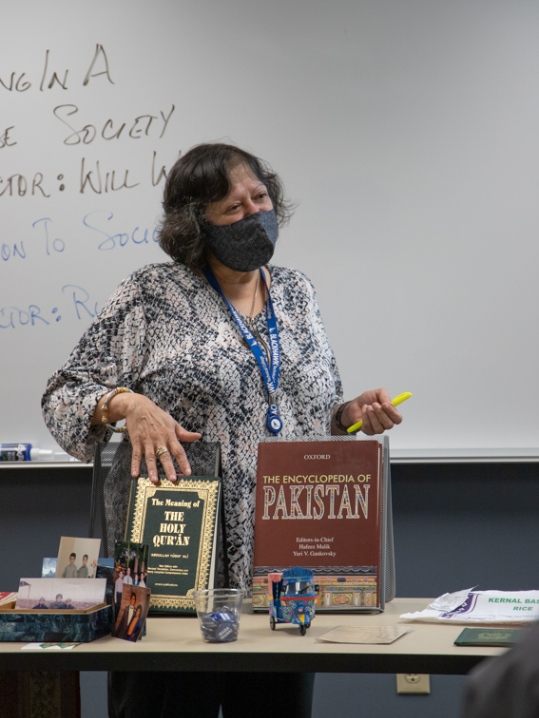Exploring Diversity through Collaborative Conversations
A Criminal Justice and Sociology Collaboration
November 12, 2020
As a City of Milwaukee Police Lieutenant, Will Walsh has had a passion for providing the officers under his watch with quality training and education. Back then, he was responsible for training and leading special interdiction teams with S.W.A.T. Today, he's retired from active duty, but he is still passionate about providing quality education to law enforcement students as an instructor at BTC.
In his course Peacekeeping in a Diverse Society, Will introduces students to the changing demographics of communities and related changes in social and institutional public policy. Criminal Justice student Victoria Bailey said the class has been enlightening to her at this time in our country. That it has "cemented the idea that our country is a mosaic, not a melting pot, each cultural background is a small, unique piece and worthy of being treated with equal dignity."
To help students understand and engage with these issues, Will brings in individuals from diverse populations to talk to his class about their experience as members of a specific cultural group and their interactions with law enforcement. Past speakers have included Barbara Hickman, former administrator for the School District of Beloit, and Dr. Sylvia Lopez, a modern language and Spanish literature professor at Beloit College. Presenters hail from the African-American, Native American, Latinx, and LGBTQ+ communities, among others. Will believes it is vital to "bring real-world conversations, perspective, cultures, and beliefs into the classroom to study them up close and raw."
Academics no longer resides in a bubble where students spend their days in dusty libraries thinking deep thoughts. Instead, students think these deep thoughts while putting their new skills into practice in their daily work, play, and family lives. "This interdisciplinary class is an expression of how we live our Blackhawk Values of being responsive, collaborative, and empowering by providing unique learning opportunities for our students," explained Dr. Karen Schmitt, Vice President of Academic Affairs.

Will and sociology instructor and Multi-Cultural Alliance co-advisor, Rubina Jan (pictured), joined classes to discuss Arab and Middle Eastern cultures. To help the students begin to understand Pakistani culture, Rubina shared a variety of artifacts, including prayer rugs, the Koran, indigenous jewelry, handwoven textiles, and many other cherished pieces.
In 1977, Rubina immigrated first to Canada and then, in 1979, to Wisconsin. Five years ago and for the first time since her immigration to the US, Rubina, along with her American partner, returned to her country of birth, Pakistan, to celebrate her nephew's wedding.
One afternoon during her visit, Rubina, her partner, and brother-in-law traveled to the top of a scenic mountain. While there, Rubina and her group noticed another family intently watching them. Unsure of why the family was watching them so closely, Rubina asked her brother-in-law what they should do. Before he was able to respond, the family they encountered began asking questions of their group. Both groups nervously approached the interaction; the Pakistanis hadn't met an American before, and Rubina's group didn't know how the Pakistanis would react. As it turned out, both groups realized that the intersectionality of the human experience is a rich, common ground.
During the class, Rubina recalled a time when someone referred to her as a Trojan Horse. Meaning, she was an immigrant who had been in the United States long enough to have many of the rights and privileges afforded to citizens; therefore, her experiences did not reflect a new immigrant's experiences. Rubina has faced discriminatory treatment and offered many examples to the class.
Her advice to those seeking to work more effectively with diverse groups is that each person should "engage in self-reflection about his/her own biases, both implicit and explicit." Knowing personal bias is how we, as individuals, can begin to acknowledge where we are placing judgment and work mindfully to move past it. She explained that if we honestly focus on beauty, courage, and dignity of all, our students can find a common resiliency source that will sustain them and help them be successful in their lives and careers.
Collaborations such as this one between the Criminal Justice program and Sociology and Gen Ed courses are encouraged at Blackhawk. As College President, Dr. Tracy Pierner said, "Interdisciplinary collaboration between instructors and subject areas is absolutely necessary for our students to begin to connect their studies with the diverse and complex world in which we live. Students learn, first hand, how our world is interconnected and how we come together to analyze information from varying perspectives and evaluate solutions based on this information."
Tracy continued, "The work of Will Walsh and Rubina Jan demonstrates how we can come together, distill information, and broaden the horizons of our students. I applaud them for their application of educational best practices and forward-thinking teaching methodology."
Victoria Bailey embraces these conversations' value as she works toward her ultimate goal of a master's degree in criminology. "Mr. Walsh has been excellent in creating a safe environment to ask really uncomfortable questions that might be controversial," she says. "I think every single person in my class is genuinely scared of asking real questions about race, gender, diversity, and preference (especially when that preference is regarding how to refer to a person who is not the same race). Mr. Walsh has been very gracious and thoughtful in the way he has responded, and it shows in the number of people wanting to ask questions."
Learning about different cultures and how they intersect in our modern world is a significant component of all educational endeavors. As Will explained, "I have always been driven to be the best loving person I can, and through that lens, I want others to see their neighbors from that perspective. Especially when it comes to policing in a diverse society."
# # #